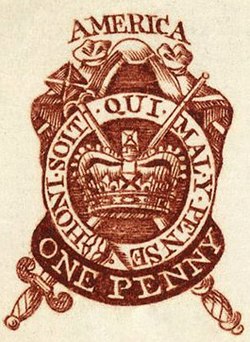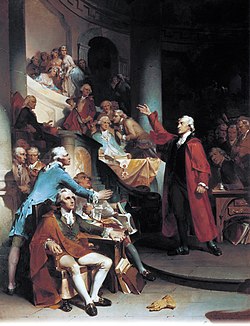1765 ⟶ Stamp Act Congress Convenes
Delegates from nine colonies attend the Stamp Act Congress w...Year
1765
1766
1774
🗣️ Stamp Act Congress Convenes
Delegates from nine colonies attend the Stamp Act Congress which adopts a Declaration of Rights and Grievances and petitions Parliament and the king to repeal the Act⟶

Stamp Act CongressDeclaration of Rights and GrievancesColonial UnityResistancePolitical ActionRepresentation
 United States
United States📰 Stamp Act Passed by Parliament
Parliament enacts the Stamp Act to impose control and help defray the cost of keeping troops in America to control the colonists, imposing a tax on many types of printed materials used in the colonies. Seen as a violation of rights, the Act sparks violent demonstrations in several Colonies. In May, Virginia's House of Burgesses Patrick Henry sponsors the Virginia Resolves claiming that, under British law, Virginians could be taxed only by an assembly to which they had elected representatives⟶

Stamp ActTaxationColonial ResistanceVirginia ResolvesPatrick HenryBritish PolicyRepresentation
 United Kingdom
United Kingdom United States
United States🏠 Quartering Act Enacted by Parliament
Parliament enacts the Quartering Act, requiring the Colonies to provide housing, food, and other provisions to British troops. The act is resisted or circumvented in most of the colonies. In 1767 and again in 1769, Parliament suspended the governor and legislature of New York for failure to comply⟶

Quartering ActBritish TroopsColonial ResistanceBritish PolicyNew YorkMilitary
 United Kingdom
United Kingdom United States
United States📜 Stamp Act Repealed; Declaratory Act Passed
British Parliament repeals the unpopular Stamp Act but simultaneously issues the Declaratory Act, Parliament asserts its "full power and authority to make laws and statutes ... to bind the colonies and people of America ... in all cases whatsoever"; designed to overrule actions by the legislative assemblies of each colony, which had traditionally held authority⟶

Stamp Act RepealDeclaratory ActBritish PolicyTaxationParliamentary AuthorityColonial Resistance
 United Kingdom
United Kingdom United States
United States🏛️ First Continental Congress
First Continental Congress,; 12 colonies send delegates; major actions:
Joseph Galloway's Plan of Union debated September 1774, calling for the creation of a Grand Council for the American colonies, with each having representation and hold and exercise power within the British Empire; rejected by the Continental Congress.[3]
Declaration and Resolves, also known as Declaration of Rights[4]
Continental Association[5]
Petition to the King to repeal the Intolerable Acts; rejected by George III⟶

Colonial UnityContinental CongressDeclaration of RightsContinental AssociationJoseph GallowayIntolerable ActsColonial GovernanceResistanceAmerican Revolution
 United States
United States